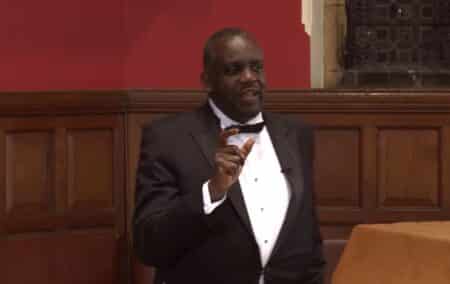Twenty years ago the South African Institute of Race Relations published the results of a nation-wide survey of racial attitudes conducted for us by Lawrence Schlemmer.
It found that for every person who thought race relations were deteriorating, two thought they were improving. The survey also found that 55% of South Africans thought that unemployment was the biggest problem facing the country, but that only 8% identified ‘race issues’ as a problem. Essop Pahad, minister in the presidency in Thabo Mbeki’s government, dismissed the Institute as ‘foolish’: ‘How the hell can you say jobs are more important than racism? Unemployment is the consequence of racism.’
The reaction to our survey was mild compared with the reaction in the United Kingdom (UK) to the recent report by the Commission on Race and Ethnic Disparities set up last year by Boris Johnson under the chairmanship of Tony Sewell. But the reactions to the Schlemmer and Sewell reports had one thing in common: anger that they challenged the view that some societies are shot through with ‘institutional racism’.
The prevalence of such ‘racism’ is one of the key tenets of the ideology of critical race theory (CRT), which has gained enormous traction in the UK and elsewhere after being cleverly exploited by the Black Lives Matter (BLM) movement following the killing of George Floyd in Minneapolis in May last year.
Dr Sewell’s report was greeted with objections that were sometimes furious, even unhinged.
Among the milder rebukes was that of the Runnymede Trust, which said it was ‘deeply, massively let down by the report’. The Labour Party leader, Keir Starmer, was ‘disappointed’ at the report’s ‘reluctance’ to address ‘structural’ issues.
‘White-supremacist lie’
One activist, Shola Mos-Shogbamimu, said Dr Sewell was a ‘token black man’ spreading a ‘white-supremacist lie’. A playwright, Bonnie Greer, said his report was ‘sick and dangerous’. A Labour Party spokeswoman, Marsha de Gordova, accused the report of ‘glorifying the slave trade’, a point also made by Owen Jones of The Guardian. One Labour MP equated the commissioners with cross-burners in the Ku Klux Klan.
A Cambridge professor of postcolonial studies likened Dr Sewell to Josef Goebbels. At the United Nations, a ‘working group of experts on people of African descent’ accused the report of rationalising white supremacy and called for Dr Sewell’s commission to be ‘disbanded or discontinued’. And so on.
Dr Sewell said the response to the report ‘has been extreme, unnecessary, over the top, ridiculous, and absurd’. He suggested that one reason for the anger on the Left was that the commissioners, though almost all black, were not race relations activists, but came from a variety of other fields. Much discussion of race relations in the UK was ‘driven by emotion or belief’. ‘Dare to question these emotions or beliefs, and you’re in trouble’. His report, on the other hand, ‘has been relentlessly focused on data’.
He also said, as this column noted last week, ‘that when people are desperate to silence you and discredit you, you must be saying something that is true.’
Indeed. Dr Sewell and his colleagues have mounted one of the most powerful challenges yet to some of the ideas that have come to dominate left-wing thinking about race in the UK and elsewhere, including South Africa and the United States (not least in the White House).
Dangerous doctrine
CRT is a dangerous doctrine. It is based on the fallacious assumption that any differences in outcome as between ethnic groups are the result of systemic or institutional racism baked into the structures of society by whites. The remedy for unequal outcomes is to reshape society by whatever coercive measures are necessary.
Powerfully asserted by ideologues, CRT has been gaining support among academics, law schools, school teachers, journalists, media moguls, business leaders, politicians, civil servants, and managers of cultural institutions and non-governmental organisations. Some of this support is ideological, some of it expedient. But it all provides a following wind for the increasing state intervention necessary to enable the true believers to push for laws to reshape society in order to meet their objectives.
The notion that societies can reform themselves is rejected, as it undermines the revolutionary thrust of CRT. Also rejected is any notion that factors such as educational achievement or family stability, rather than race, may account for how ethnic minorities fare. Further rejected is factual information that contradicts the CRT narrative. There is no place in CRT for truthfulness, reason, or moderation.
The doctrine is essentially totalitarian. Critics are beyond the pale and must be silenced by having platforms denied them or drumming them out of universities. Museums, even houses belonging to the National Trust, must become purveyors of the new ideology. Children must be indoctrinated about the horrors of colonialism and the wickedness of ‘whiteness’.
‘Borders on racism’
Moreover, of course, racial conformity is essential. Your racial identity determines what you may think. Dr Sewell was branded a ‘token black man’ and worse. The abuse directed at him, he says, is a ‘sort of antiracism that borders on racism’.
Racism supposedly explains everything. If there are more black youths in prison than their share of the population, this is the result not of the proportion of crimes committed by such youths but of racist laws, racist police, and racist judges.
CRT is also fundamentally at odds with the key attributes of liberal democracy, among them freedom of speech, the rule of law, equality before the law, limited government, and the primacy of the individual.
The hostility to Dr Sewell’s report is explained by the fact that it is fundamentally at odds with CRT’s world view. He has asserted truth over ideology and liberalism over totalitarianism. And he detects desperation ‘not only in black lobby groups but [also] on the white left’.
‘They’re frightened of the report.’ So they should be.
[Image: Dr Tony Sewell CBE, addressing the Oxford Union. https://www.youtube.com/watch?v=3sUvEobPTZg]
If you like what you have just read, support the Daily Friend

